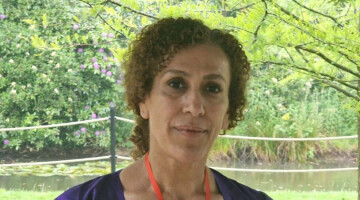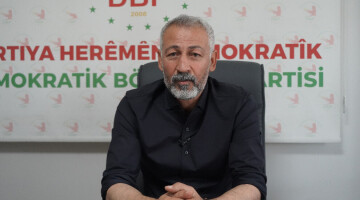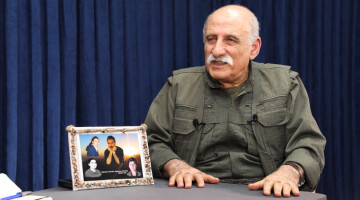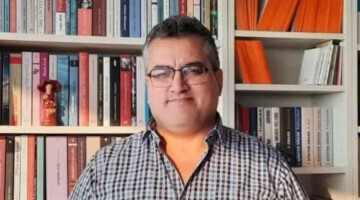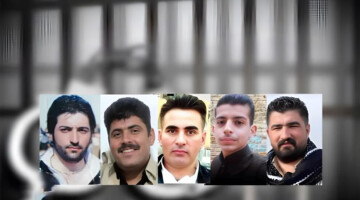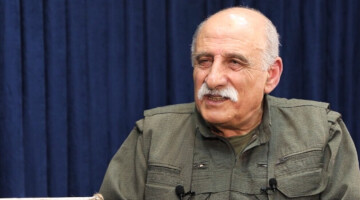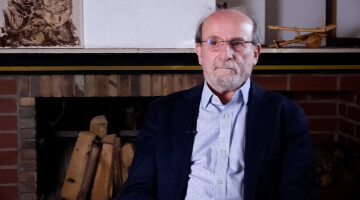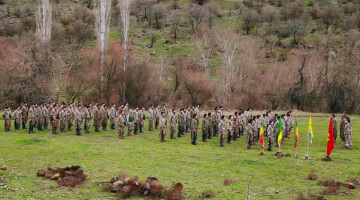Attending the “Freedom for Öcalan, Status for Kurdistan” march that started on February 1, 21 year old activist and photographer from Bern, Switzerland, Claudio met the Kurdish struggle while he was in the anarchist groups he’s been active in for years. Claudio says after he saw the changes with the Rojava revolution, the Kurdish struggle has started taking up more of his efforts, and as a result he decided to take part in this march today.
Claudio says: “I’m here because I know that this struggle needs to be supported and that Öcalan’s freedom is an important part of this struggle.”
Claudio remarks that it’s possible to implement Öcalan’s ideas, primarily democratic confederalism, in Europe or in other parts of the world, and that different circumstances need to be taken into account: “Of course Europe or Latin America are different societies. Surely we can’t implement all the ideas everywhere in the same way dogmatically. For example, we can take into consideration the stronger economic situation in contrast to other places. And in the Middle East, there are companies, most of them based in Switzerland, that exploit the oil. Or, while agriculture is important in Rojava, 3% of all employment is in agriculture in Switzerland.”
“ÖCALAN EXPRESSES A MORE MODERN APPROACH TO PROBLEMS”
The Swiss activist points out that the Kurdish People’s Leader is a deep thinking person and historical development has an important place in his analyses and adds: “These analyses also cover the current state of affairs in the world. For this, Öcalan is an important person.”
Claudio says Marxist or classical anarchist thought have developed in a time when the world was very different, but Öcalan brings a more modern approach to problems.
“FOR THE STRUGGLES OF THE PEOPLES OF THE WORLD, FIRST THE KURDS SHOULD BE SUPPORTED”
Swiss activist Claudio lastly stressed that the Kurdish freedom struggle isn’t something that only concerns the Kurds, and thinks that it is a struggle that belongs to all cultures and ethnicities, including Europe. Claudio insists that as a start to a struggle to benefit the peoples of the world, the Kurds should be supported and this shouldn’t be limited to only the Kurds.
“THE DISTANCE WE WALK ISN’T IMPORTANT WHEN YOU LOOK AT WHAT PRISONERS GO THROUGH”
Argentinian activist living in Spain, Julian says he joined the Long March to support the Kurds’ struggle against fascism in Turkey and the demand for freedom for the Kurdish People’s Leader.
Julian says his interest in the Kurdish struggle increased after the Rojava Revolution and gives the example that many collectives have sprung up in Spain in support of the Kurdish struggle.
Julian points out that the physical strain brought by the almost 300 km long Long March between Luxembourg and Strasbourg fades in comparison with what the political prisoners go through and says: “I think this demonstration is very meaningful. Even if we have to walk a thousand kilometers. It’s not a matter of physical strain or cold weather, as we have a fire in our hearts and that fire warms us. When you have that, you can walk 30 kilometers a day without a hitch. Let’s look at it this way; all these fade in comparison with what thousands of prisoners in Turkey go through. This is the least we can do to inform people in places we pass through about what’s going on.”
“TIME TO SUPPORT THE KURDS RATHER THAN GIVING THEM ADVICE”
The Argentinian activist stresses that colonialism and its institutions have the same effect anywhere in the world, and naturally there are similarities between the style of struggles and activities of the people. Julian says the Kurds are one of the people to suffer the most from nation-state policies, and remarks that the Kurdish people should be supported, rather than given advice.
Julian concluded with the following: “The westerners and the Latin countries that may be considered western don’t have much to give in advice any more. It’s now time to listen to the Kurds, to understand and support them, rather than to talk. Europe has spoken enough. Now it’s time to show solidarity.”


